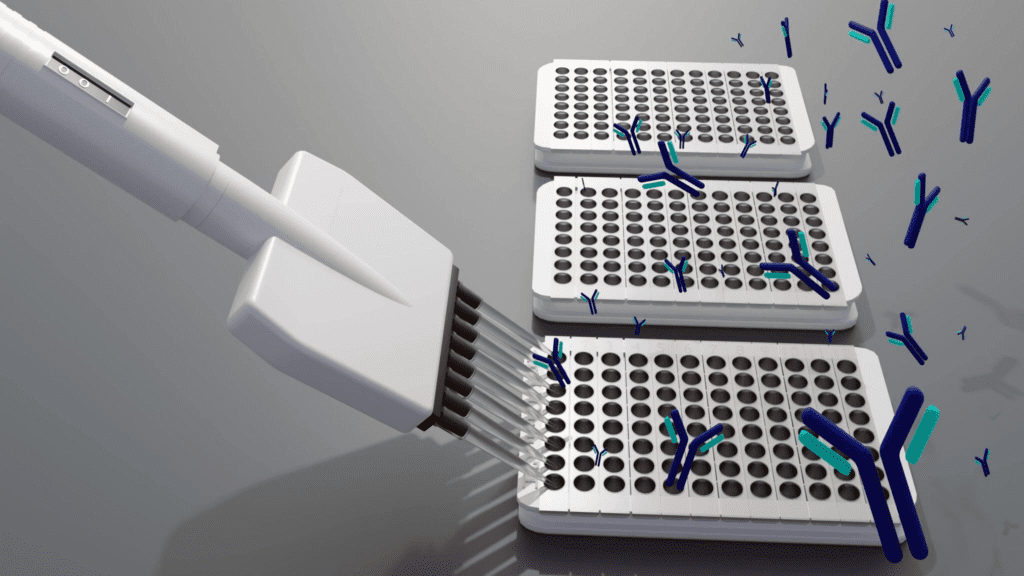
Biochemist technology is in a rapid and continuous evolution to ensure more effective development. Analyte detection is a necessary process, especially in antibody and protein production. Therefore, scientists strive to find an effective method that can help to detect analytes and analyze them quickly.
ELISA technique is one of the most influential technologies applied in analyte detection. Scientists can quickly examine their samples and detect their target analytes. However, choosing suitable ELISA kits is challenging since many manufacturers are in the market today.
Read the following article to learn the effective tips for choosing an ELISA kit.
What is an ELISA?
ELISA, the enzyme-linked immunosorbent assay, is a microplate-based method for testing for specific analytes, such as antigens, antibodies, and other protein components. The ELISA technique captures the target analyte on the surface of the microplate and then uses the enzyme-labeled antibody to detect the analyte binding.

One primary reason ELISA is an ideal technique for testing analytes is its high sensitivity, which allows for testing more complex samples, such as serum, cell culture supernatant, and other biological fluids. Other benefits of using ELISA assay include it is easy to use, it is easy to acquire quantitative results, and you can couple it with automation to improve its effectiveness. This is why most laboratories that provide a recombinant antibody service prefer to use the ELISA technique.
When choosing an ideal ELISA kit, there are several factors you must consider. Ensure you carefully assess the performance of the essay, sensitivity, dynamic range, and precision. Other features of ELISA kits include linearity dilution and percentage recovery for better performance of your kits.
Here Are the Standards For Choosing the Perfect ELISA Kits
Since choosing the right ELISA kits is challenging, here are some quick criteria to help you make a quick but wise decision.
1. The Species For Testing
The species you want to use in your testing can significantly impact the choice of your ELISA kits. It would help if you considered the samples you would use. For example, you can use validated ELISA kits for human, rat, or mice samples. In this case, you try to consider a kit validated on the species you are testing and match the homology of your study. Nevertheless, getting more advanced kits for other species, such as dogs and monkeys, is more manageable with modern ELISA kits.
2. Linearity and Recovery Experiments
To test and monitor the effectiveness of ELISA kits, you can do recovery and linearity experiments. The recovery test is meant to assess the impacts of variations in any sample matrix on detecting analytes. Recovery is ideal when it is very high.
The linearity experiment, on the other hand, tests for the response of the analyte in a given diluent. A perfect sample should have a similar concentration to the dilutions. In most cases, you will get the recovery and linearity information in the product specifications described by the manufacturer.
Further, you will get other crucial information, such as sensitivity and dynamic range, for better clarity and ease of selection. Different manufacturers provide varying data parameters for ELISA kits. Therefore, examining all these parameters, especially the recovery and linearity data, is good when selecting the fitting kit.

3. The Type Of Analyte For Detection
Before choosing the ELISA to purchase, you must determine the type of analyte you want to test. A Sandwich ELISA is ideal for assessing huge proteins with many epitomes, such as a cytokine. On the other hand, competitive ELISA is majorly used to examine small molecules.
Most ELISA kits are validated to fit on culture supernatants and serum/plasma. Therefore, carefully reading the product details and description is suitable before purchasing the kits. This is a perfect way to ensure you get a convenient kit for the sample you wish to analyze.
Further, how you collect the plasma sample can significantly affect the type of ELISA kits to buy and also the results. Other factors include the lips and hemolysis in the piece, as they affect the kit’s performance. Ensure you note all these factors before you choose your ELISA kit. Further, to ensure you get the fitting kit, you can make a pre-test trial, which will help you determine the sensitivity and compatibility of the kit.
4. Types of Antibodies
The antibodies used on ELISA kits will significantly impact your choice of kit type. Therefore, before selecting one, enquire about the supplier or manufacturer and the type of antibodies used on the kit. You will find whether they use polyclonal or monoclonal antibodies in this case. For Sandwich ELISA kits, it’s ideal to use polyclonal antibodies for capturing antibodies, and for antibody detection, you should use monoclonal antibodies.

5. The System Used For Detection
ELISA kits have different detection systems, such as luminescent, colorimetric, and fluorescent techniques. All ELISA kits have an analyte obstruction used in enzyme labeling and another similar substrate. Therefore, it’s essential to choose the right identical substrate and enzyme. Moreover, you should carefully select the enzyme substrate for better reactivity, the microplate, and the detection devices.

Wrapping Up
Selecting the right ELISA kit can be challenging. However, the above standards allow you to easily select the best ELISA kits. If it is your first time buying and using ELISA kits, it would be good to do thorough research, inquire from experts, and compare several kits before deciding which one to take. Most manufacturers always provide a comprehensive guide on their kits, how to use them, and all the essential information you need to know.






